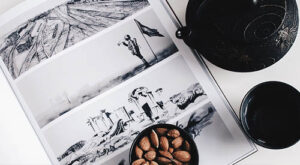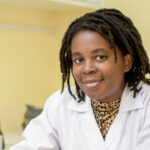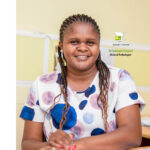Pioneering Dr Esther Kalambi-Matengu‘. . . one of only two Namibian-born haematologists’
STAFF WRITER
Dr Esther Niilonga Kalambi-Matengu is a Haematologist, one of only two Namibian-born doctors specializing in the branch of medicine involving study and treatment of the blood. They do research, diagnosis, treatment, and preventing blood disorders and disorders of the lymph system (lymph nodes and vessels).
In a Question-and-Answer session she talks about how she landed in this specialist position at the Namibia Institute of Pathology (NIP).
Q: Tell us about yourself:
A: My name is Esther Niilonga Kalambi-Matengu. I was born in Onayena village, in the Oshikoto region. I grew up with my grandmother before relocating to Windhoek at the age of five.
I did my primary education in Windhoek and most of my high school in Pretoria, South Africa, but matriculated at Concordia College in Windhoek.
I obtained my undergraduate medical degree (MBChB) from the University of Pretoria and completed my haematology (FCPath- Haem) specialization at the University of the Free State in South Africa.
I describe myself as an extroverted introvert. Despite being someone who values alone time, I enjoy socializing and meeting new people. My favorite pastime is travelling and learning about the diverse cultures around us.
Q: What is your occupation and why did you choose it?
A: I am a haematologist at the Namibia Institute of Pathology (NIP). Interestingly, my career path led me to haematology despite the limited exposure to the subject during my medical degree programme. During my tenure as a medical officer, my curiosity sparked a deeper interest in haematology, leading me to pursue further education and training in the field by applying for a specialization post.
Q: There are those who have known with certainty what they wanted to be when they grew-and then there are the rest of “us”. In which group are you and how many “wrong turns” did you make before arriving here? What lessons were learnt, if any?
A: I believe I embody a combination of both groups. I have always known that I wanted to be a medical doctor, however I never thought I would end up pursuing a career in haematology.
In the early stages of my medical training, I imagined myself becoming a neurologist. However, as I advanced through my internship, I came to the realization that I wasn’t fond of clinical medicine as much. This realization led me to explore other medical specialties and I found myself in the anesthesia department, which I considered less clinically-oriented specialties during that time, at the Windhoek Central Hospital/Katutura Intermediate Hospital complex.
Even though anaesthesia piqued my interest initially, I soon discovered that it didn’t satisfy all of my professional aspirations. I ultimately found my calling in haematology, a field I find to be deeply gratifying.
My experience taught me the significance of selecting a profession that you feel passionate about. This not only adds to your quality of life as a doctor, but also shows in the service delivery you provide to your patients.
Q: As a professional, do you have any role models that you look up to, inside and outside your field?
A: In my personal perspective, my paternal grandmother, with whom I share my name, is the person I still look up to as a role model. Despite her passing, she always taught me to approach life from a broader perspective and to always strive for the best.
In terms of my career, I consider Professor Marius Coetzee, the chief of the haematology department during my specialization training as my role model. He not only served as my mentor in the medical field but also assumed a fatherly role, particularly during the Covid-19 outbreak, when being separated from home was tangibly felt.
Nonetheless, I appreciate the pivotal roles played by each individual I met along my journey that helped shape me into the person I am today. It really takes a village, not only to bring up a child but also to help us navigate through the sometimes treacherous journeys of specialization.
Q: What challenges do you meet on the job because you are a female, and how do you solve them?
A: I am fortunate not to have experienced any gender bias in my career as haematologist, thus far. Which is a refreshing experience.
Q: How do you balance being a mother or wife and a professional? What have you sacrificed professional and personally at this stage of your career?
A: Although I am neither a mother nor a wife, the sacrifices I made during my specialization to become a female haematologist should not minimized. This was felt more strongly when the world was on lockdown and I had to be away from my family, especially during the preparation for my final exams.
Having said that, laboratory haematology is one of the few medical fields that allows for a good balance between family and work time.
Q: What advice do you give to women aspiring to embark on career like yours?
A: Be an innovative and transformative thinker. I am one of two Namibian-born haematologists and both of us are female. There is room for more specialists in my field. Pathology is often an overlooked specialization but one that plays an important role in diagnostic processes.
If you have the passion and interest in any of the pathology disciplines, I say GO FOR IT!
Q: What does international Women’s Day mean to you?
A: Traditionally, women have been considered ‘kitchen people,’ with roles confined to getting married, bearing children, and tending to households.
Now, on International Women’s Day, I am reminded that we have broken these traditional expectations. The freedom granted us by our constitution has allowed us to unlock our potential to contribute in more ways than one to our communities. It is up to us to think outside the box and be innovative with the potential we have.
Q: Anything we might have omitted?
A: Let us not forget that gender equality, good health and well-being are two of the Sustainable Development Goals (SDGs) which apply to the medical field, including but not limited to haematology.
So let us move with the international wave, and empower our women to have equal opportunities and access to contribute to the medical field. After all, the future is FEMALE.







